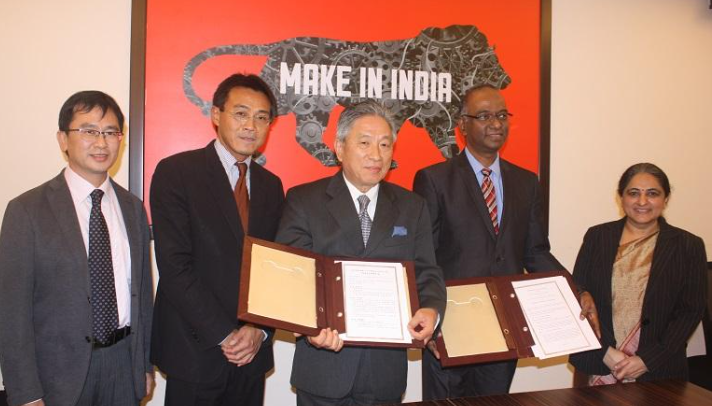India Taiwan have signed a Memorandum of Understanding (MoU) to facilitate the employment of Indian workers in the island nation’s semiconductor sector, which is facing a severe labor shortage amid a global chip crunch.
The MoU, signed on Friday by representatives of the two countries’ de facto embassies in Taipei and Delhi, promises mutual benefits for the people of both countries, igniting a powerful momentum for even deeper and more fruitful cooperation, according to the Ministry of Foreign Affairs of Taiwan.
The MoU was signed virtually by Manharsinh Laxmanbhai Yadav, director general of the India Taipei Association, and Baushuan Ger, head of the Taipei Economic and Cultural Center in New Delhi, the de facto missions of the two countries.

Strengthening India and Taiwan bilateral labour Cooperation
According to a statement by Taiwan’s labour ministry, the MoU will strengthen bilateral labour cooperation and open the doors for Indian workers to seek jobs in Taiwan, especially in areas such as manufacturing, construction and agriculture, where the island is facing a shortage of human resources.
The statement also said that Taiwan will initially seek Indian workers with good English proficiency on a small scale, and if the results are satisfactory, the openings will be gradually increased. The two sides will hold follow-up meetings to discuss the details of the implementation of the MoU, such as the industries, number, qualifications, and recruitment methods of the Indian workers.
Opportunity to diversify Taiwan’s foreign Workforce
The MoU comes at a time when Taiwan, a major semiconductor producer and a global leader in the technology sector, is looking to diversify its foreign workforce beyond its traditional sources in Southeast Asia. Taiwan currently hosts over 700,000 migrant workers, mostly from Vietnam, Indonesia, the Philippines and Thailand, who work in manufacturing or as home assistants for the elderly.
India, on the other hand, has a large pool of skilled and semi-skilled workers who can contribute to Taiwan’s economy and benefit from the exposure and experience in the island’s advanced industries. India and Taiwan have also been strengthening their commercial partnership in recent years, with efforts to attract more Taiwanese technology companies to invest and produce in India.
A crucial Step towards Fostering close diplomatic ties
The MoU is also seen as a positive step towards fostering closer ties between India and Taiwan, which do not have formal diplomatic relations due to China’s claim over the island. However, the two sides have maintained unofficial contacts and exchanges, and have shared common interests and values in the Indo-Pacific region.
The MoU is expected to create a win-win situation for both India and Taiwan, as it promises mutual benefits for the people of both countries and ignites a powerful momentum for even deeper and more fruitful cooperation.
 WireUnwired Extra
WireUnwired Extra
The Genesis of a Tech Titan: Taiwan’s Semiconductor Journey
Taiwan’s transformation from an agrarian economy in the 1960s to a global semiconductor powerhouse is a tale of strategic foresight, state intervention, and seizing global economic opportunities.
State Intervention and Industrial Policy
In the 1960s, Taiwan was primarily an agricultural economy. Recognizing the potential of the burgeoning semiconductor industry, the state intervened with industrial policies aimed at job creation, technology acquisition, and strengthening security ties with the US.
Globalization and the Electronics Industry
The 1970s saw a shift in the global semiconductor market. Japanese competitors began challenging American dominance. In response, American and Dutch firms started investing in East Asian countries, including Taiwan, to leverage lower labor costs and skilled workforces.
The Rise of TSMC
The establishment of the Taiwan Semiconductor Manufacturing Company (TSMC) marked a significant milestone in Taiwan’s tech journey. TSMC, now responsible for around 50% of global semiconductor chip production, has become a linchpin of the global economy.
Current Dominance and Future Prospects
With the advent of personal computers and smartphones, Taiwan’s IC design industry has grown exponentially, boasting revenues of US$22.4 billion by 2019. As the world becomes increasingly reliant on semiconductors, Taiwan’s role as a global leader in this industry is set to continue, promising a future where innovation meets opportunity.
Related Articles:
Global Semiconductor Powerhouses: Top Semiconductor Fabs-Hosting Nations – WireUnwired
“India Semiconductor: How India Aims to Lead by 2026” – WireUnwired
TSMC global expansion to launch Japan fab next month 2024, US plant faces delays. – WireUnwired
https://engelsbergideas.com/notebook/how-taiwan-won-the-semiconductor-race/
Discover more from WireUnwired Research
Subscribe to get the latest posts sent to your email.




